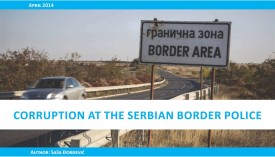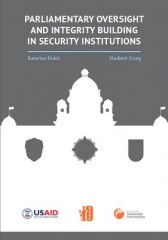RELATED

Date: 18.11.2019.
Author: Belgrade Centre for Security Policy
Data Protection Impact Assessment for Video Surveillance developed by Serbia’s Ministry of Interior (MoI) does not meet the formal or material requirements laid down by the Law on Personal Data Protection, which is why the MoI should suspend the introduction of smart video surveillance systems. Civil society organizations SHARE Foundation, Partners for Democratic Change Serbia and the Belgrade Centre for Security Policy (BCSP) have analyzed in detail the Data ...

Date: 24.11.2017.
Author: Belgrade Centre for Security Policy
Controlling the financing of non-profit organizations is one of the obligations of the Republic of Serbia in the fight against terrorism, but it should not jeopardize the democratic right of free association, is the conclusion of a meeting organized by the Belgrade Center for Security Policy (BCSP), YUCOM and ISAC Fund, National convention on the European Union (NCEU), held on November 21 at the Palace of Serbia. This meeting ...

Date: 03.12.2015.
Author: Belgrade Centre for Security Policy
Transparency International published the results for Serbia in the framework of the second round of the Government Defence Anti-Corruption Index survey encompassing more than 100 countries. This index measures risks of corruption in national defence and security establishments. The risk assessment for Serbia was carried out in cooperation with Belgrade Centre for Security Policy.
Date: 14.11.2014.
Author: Belgrade Centre for Security Policy |
The report is structured to present findings relevant to the policy areas covered in the European Commission’s Progress Report for Serbia for 2014, as well as to highlight additional important issues. This report contains a separate chapter related to the process of producing Action Plan for the chapter 23 and also a special segment devoted to the problems that emerged after the floods that hit Serbia in May, including inappropriate responses by the state institutions and the corruption risks that appeared in the aftermath of these events.
Date: 09.10.2014.
Author: Katarina Đokić | Vladimir Erceg |
BCSP researchers Katarina Djokic and Vladimir Erceg analyze the role of the Parliament in the oversight of those aspects of the security institutions’ work where the corruption risks are particularly prominent: budgeting and management of finance, public procurements, material resources management, human resources management, application of special procedures and measures for secret intelligence gathering.

Date: 04.08.2014.
Author: Saša Đorđević |
Police corruption at the Serbian Border Police is assessed in the new analysis of the BCSP researcher Sasa Djordjevic. At the beginning of analysis, the attitudes of citizens and police on corruption in the border police are represented, and after, the risks and forms of corruption.

Date: 04.06.2014.
Author: Belgrade Centre for Security Policy
Management of human resources, procurements, and additional work of officers which is incompatible with police work are the main risks of corruption in the police. In order to manage an efficient fight against corruption, it is necessary to depoliticize the police, have a transparent human resource management, and build the integrity of policemen as well as their superiors. It was concluded during the conference: "The risks of corruption in the police force and strengthening the integrity of the police".

Date: 29.04.2014.
Author: Belgrade Centre for Security Policy
Exchange of information and creation of optimal conditions for realistic reporting regarding the level of presence of corruption risks in the Ministry of Defence of Republic of Serbia were the main objectives of the meeting held on April 24 in 2014 at the Ministry of Defence.

Date: 25.06.2013.
Author: Belgrade Centre for Security Policy
Corruption risk assessment methodology, as well as the mechanisms and instruments for addressing those risks were at the very focus of the regional seminar that gathered 10 think-tank organizations from the Western Balkans. The seminar was aimed at raising research capacities of the participating organizations in dealing with police corruption, and has also served for exchanging participants’ knowledge on this subject. The BCSP was represented at the seminar by ...







